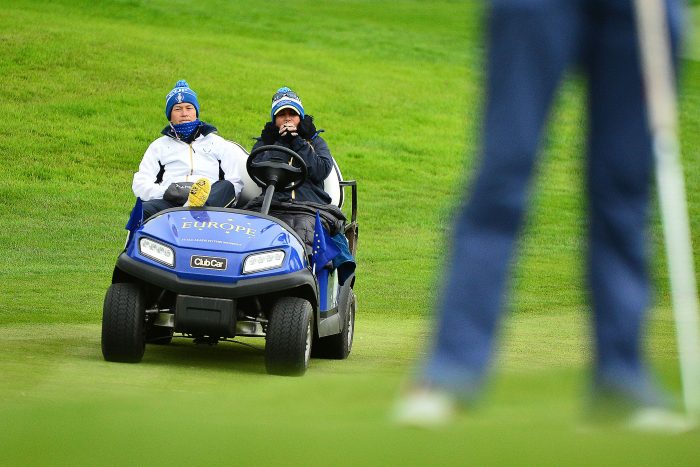Can our club ban golf buggies?
In its latest article offering legal advice to golf clubs, the National Golf Clubs’ Advisory Association (NGCAA) details the legal obligations on clubs as far as implementing buggy restrictions are concerned.
It is that time of year again when we see an increase in the number of enquiries about golf buggy usage in poor ground conditions. We discuss below the legal obligations on clubs as far as implementing buggy restrictions are concerned.
The permitted and safe use of golf buggies on a golf course must be considered by all clubs to ensure compliance with both equality and health and safety legislation. This note gives an outline of:
- A club’s duties under equality law to disabled players in the context of the use of golf buggies; and
- Health and safety issues, including particular considerations where clubs must balance the requirements of both equality and health and safety law.

© Tristan Jones
Equality – duties to disabled players
Under equality legislation, a golf club must not unlawfully discriminate on the grounds of ‘protected characteristics’ including disability. This means clubs have legal duties to those members, associate members, visitors, and guests who are disabled within the meaning of the legislation.
A person has a disability under equality law if they have a physical or mental impairment and that impairment has a substantial and long-term adverse effect on their ability to carry out normal day to day activities. Some disabilities will obviously satisfy this test and no evidence will be required. In other cases, medical input will be needed to understand if an individual is classed as having a disability. A club can therefore consider asking that players provide medical evidence of disability when requesting a buggy.
Disability is relevant where a disabled person is at a substantial disadvantage compared to non-disabled persons regarding a relevant matter (such as accessing the course). The club is then under a duty to make reasonable adjustments to avoid and reduce such disadvantage (such as allowing use of a golf buggy).
The duty to make reasonable adjustments for disabled people is to ensure that they are able to join the club and access its benefits, facilities or services as far as is reasonably possible to the same standard and on the same basis usually offered to people without a disability. The duty is an anticipatory duty and should anticipate the reasonable requirements of disabled people with a range of impairments.
It is recommended that a club should consider its duty to make reasonable adjustments on a case by case basis.
In addition, it is unlawful to discriminate by association. This means that clubs must not treat someone less fairly because they are linked to or associated with a disabled person. For example, if the father of a disabled junior golfer was unable to participate in a parent and child competition because the junior was prevented from using a buggy, this would be unlawful discrimination.
Buggy use
A club must make every endeavour to allow a disabled golfer who requires a buggy to play golf, the use of a buggy.
Clubs may determine their own policy on charging. However, it is recommended that if the disabled golfer is refused permission to use his / her own buggy, but is permitted access using a buggy supplied by the club, then in this instance no charge should be levied.
A club does not need to provide dedicated parking / storage for disabled golfers’ buggies.
A club can ask that requests for a buggy are made in advance of a player’s visit to help the club administer and manage requests. It is recommended that clubs have a suitable booking system in place to ensure availability of buggies.
Buggy bans
A club may not impose a blanket ban on buggy use. Bans should be limited to areas and times strictly necessary for health and safety reasons or to avoid reasonably anticipated damage to the course.
The club’s completed risk assessment of the course will determine what health and safety issues may be relevant and affect buggy use day by day. If health and safety issues are identified which affect buggy use, the club must take reasonable steps to eradicate or minimise the risk before implementing the ban. Health and safety reasons should only be used to justify restrictions on the use of buggies by disabled people where the specific course and ground conditions have been considered carefully and clear evidence is available to support the decision.
If the buggy ban is to avoid course damage, the club should carefully consider the course and record clear evidence of the anticipated or actual damage and the related financial or other implications to support the decision.
The club could consider and, if possible, make reasonable adjustments such as:
- having clearly defined routes to identify sensitive areas;
- possibly introducing pathways in certain areas;
- implementing the 90 degree rule for traffic management (travel in the rough until level with the ball – but risk assess that route!);
- limiting the number of available holes; and
- having widely available notice of these adjustments.
Even if a ban is consequently introduced, it:
- can only relate to those areas deemed to be dangerous / susceptible to damage, and not the whole course; and
- must be reviewed on a daily basis, and such decisions recorded for inspection.
Decisions in relation to golf buggy use and bans should be jointly made by the club manager and the head greenkeeper. A written record of health and safety inspections and decisions should be maintained for inspection.

© Mark Runnacles/LET
Health and safety
The club has a duty of care to users of ride-on buggies and should therefore carry out risk assessments for buggy use. Clubs will need to conduct a general use risk assessment and daily risk assessments which determine if, when and where buggies may be used on the course.
The daily risk assessment should include a hole by hole inspection of the course considering: any relevant weather conditions; the topography and ground conditions; the condition of and suitability of the golf buggy; and any other relevant considerations which could impede the safe use of a golf buggy or impact on the safety of others.
If areas of risk are identified, the club should conduct an audit to identify what remedies should be put in place to minimise or eradicate the risk or, if it is considered that buggy use may need to be restricted, the club should establish what reasonable adjustments can be made to enable disabled people needing buggies to continue to access the course and facilities of the club. The club is not able to limit its liability by using disclaimers.
Policies and procedures
All clubs must have written buggy policies. These policies should include:
- A buggy policy, for disabled and non-disabled people;
- Information about course health and safety risk assessment specific to buggy use;
- A damage risk assessment (on course) specific to buggy use;
- Traffic management; and
- Possibly, a buggy user guide including a map showing restricted and dangerous areas and one-way systems.
Players using a buggy should be provided with the club’s buggy policies and should be required to complete and sign a ‘Buggy Use Acknowledgment Form’ prior to use.
Clubs are responsible for ensuring buggy policies are complied with. The policies should therefore be distributed and displayed to staff and visitors. Staff should be given relevant training where appropriate. A club may refuse permission for use of a buggy if terms and conditions for use are not complied with by a user.
Insurance
An additional point to consider when allowing use of golf buggies is insurance cover. A club should review its insurance arrangements and ensure that it, or each buggy driver, has adequate cover for buggies owned by the club (and buggies owned by individuals where use of privately-owned buggies is permitted), including personal and third-party insurance.

For further advice on this or any other matter affecting the law for a golf club, please contact Alistair Smith on 01886812943 or alistair@ngcaa.co.uk
The National Golf Clubs’ Advisory Association (NGCAA)
The Media Centre, Emirates Riverside,
Chester-le-Street, County Durham, DH3 3QR
Tel: 01886 812943
email info@ngcaa.co.uk















Many years ago shops and pubs etc were told they had to make themselves disabled friendly it seems that a large proportion of golf clubs are still unwilling to be inclusive in their attitudes preferring the health of grass which is extremely forgiving and amazingly hardy to that of people. It’s time these committees for that is usually what is the issue were brought to heel and the law did something about it
It has gone on long enough, my two closest courses have BLANKET BANS FOR THE WINTER. I can’t fight it I’m not well enough who will, or do we just sit at home and die a little more inside in the dark cold months until someone says we can play again and oh by the way you still hav to pay
Many years ago shops and pubs etc were told they had to make themselves disabled friendly it seems that a large proportion of golf clubs are still unwilling to be inclusive in their attitudes preferring the health of grass which is extremely forgiving and amazingly hardy to that of people. It’s time these committees for that is usually what is the issue were brought to heel and the law did something about it
It has gone on long enough, my two closest courses have BLANKET BANS FOR THE WINTER. I can’t fight it I’m not well enough who will, or do we just sit at home and die a little more inside in the dark cold months until someone says we can play again and oh by the way you still hav to pay.
My club has introduced a buggy ban. I am disabled and can only play with a buggy, Am I entitled to a refund of subs for every day the ban is i place?
Our club championship has always banned buggies on championship day but allowed the use of buggies in every other competition. Someone who can walk reasonably well has acquired a GP certificate which he says allows him to use a buggy which now gives him an advantage over the others who are walking 36 holes. The whole idea of a club champion is the one who the best player at the club without use of an outside agency.
Sounds like you have a mental disability yourself.
Recently one of our senior matches had a no buggy policy due to adverse ground conditions, one of our seniors is asking that the competition now be voided, (one of nine games best five scores to count) I understand that he uses a buggy due to disability issue rather than age. The game was two weeks ago !!
More than one way to skin a cat and It’s simple , you create a traffic light system based on health and safety law for the use of trolleys and buggies with Red being the most severe . You therefore create a red route that basically is maybe up and down one or two holes or whatever number you want that provides a minimum ‘safe’ opportunity to play. #voila problem solved. … If your course is hilly or has undulating fairways then use risk assessment that all hilly inclined holes as unsafe on ectrem conditions . – the law is there to be used on both sides. But don’t forget enforced carry only also is affected by the law it’s not just mechanical buggies, it you ban trolleys you need to consider the guy who has a pace maker or is unable to carry due to badnknees etc and therefore must not be discriminated against – it’s all about provision of services .
Our golf club has three buggies predominately used by the disabled and elderly!
My problem is that the club when we have some adverse weather put the buggies off, whilst I can accept course closure’s due to adverse conditions I find it discriminatory to allow the membership access to the course but disabled can not play.
Trollies are allowed without winter wheels which in my opinion can do more damage to a wet course than 3 buggies.
Having recently returned from a visit to my son in London he is a member of two courses, one which in winter has paths you must adhere to, the other course when conditions are perceived to be adverse ban buggies but make them available to the disabled with proof of disability eg a blue badge, you sign a form excepting liability the also provide details on each hole where you must drive.
What is my position in taking the golf club to task re this situation!
If any one actually reply to this post I would also be interested in the resulting information
Within the buggy type there must be a clear advantage and distinction between a two seater and a lightweight single seater buggy which minimize any course damage